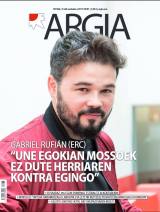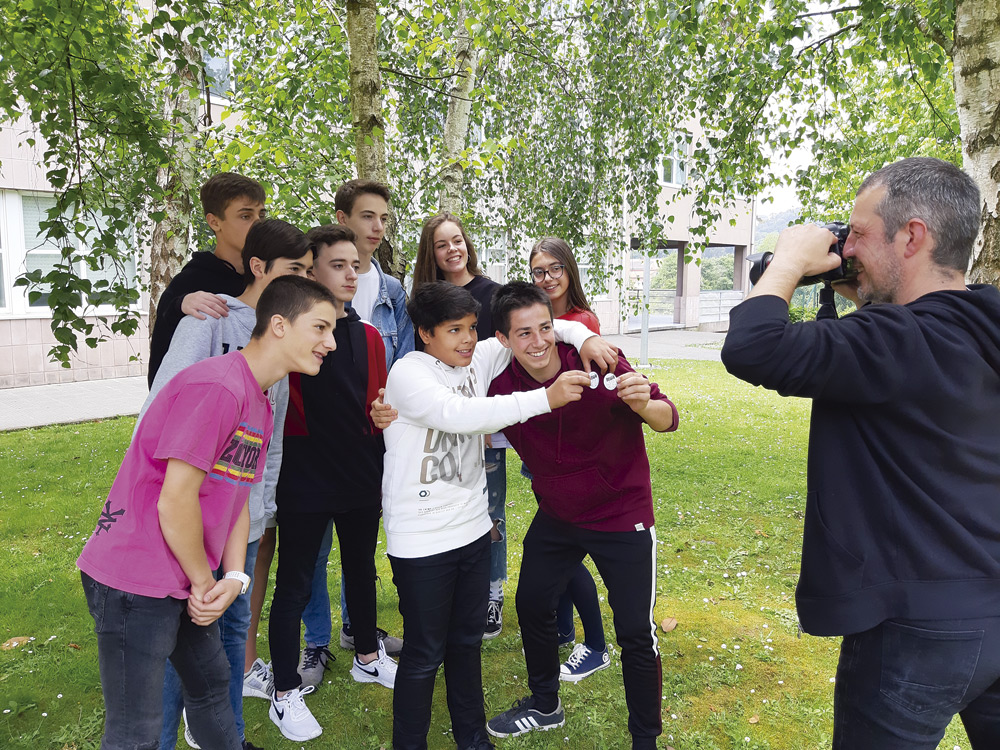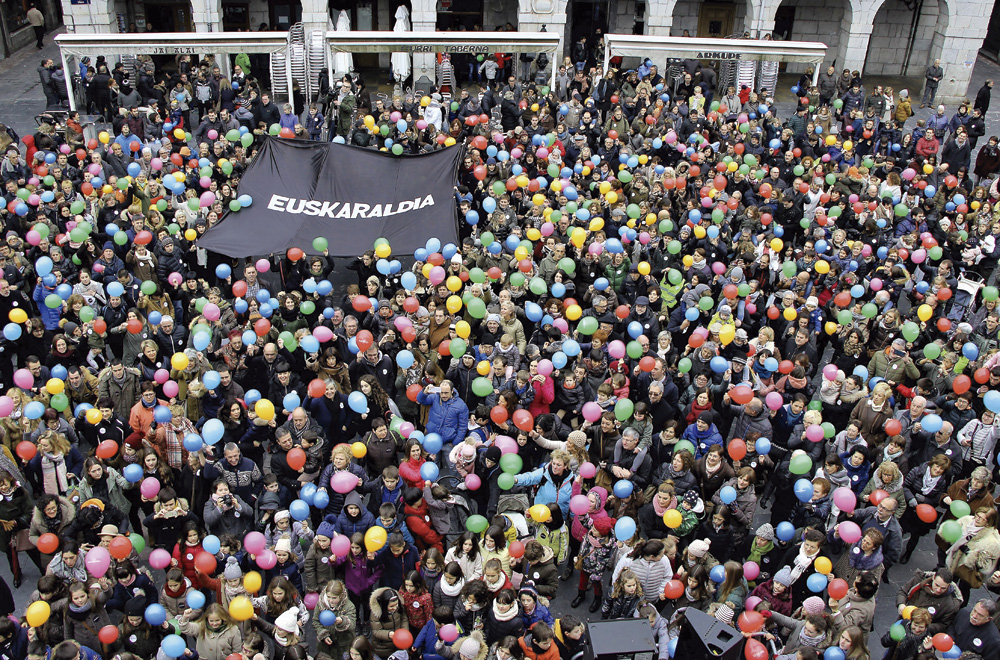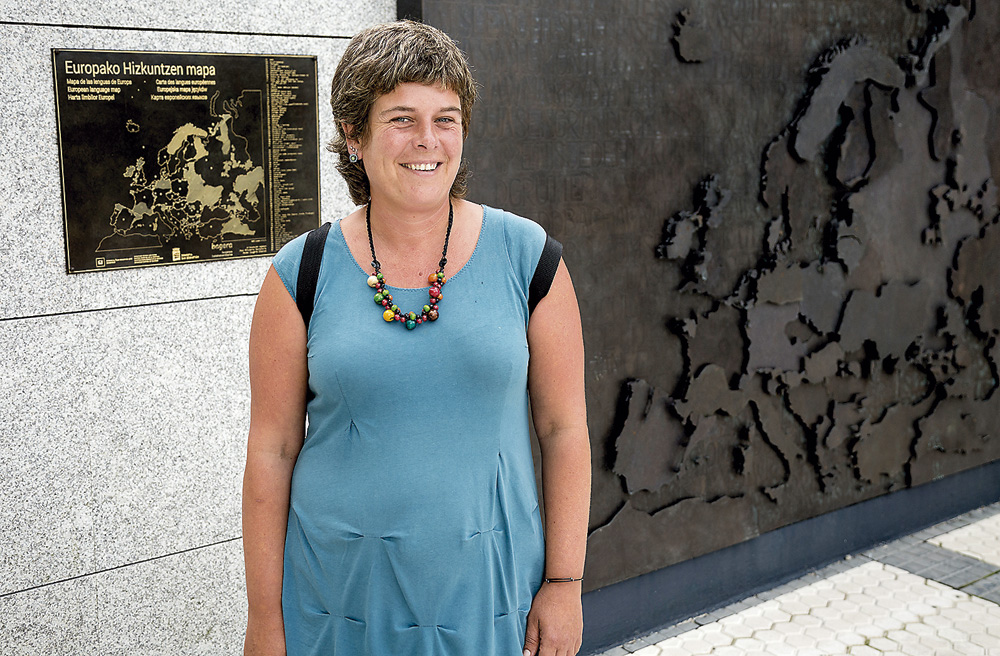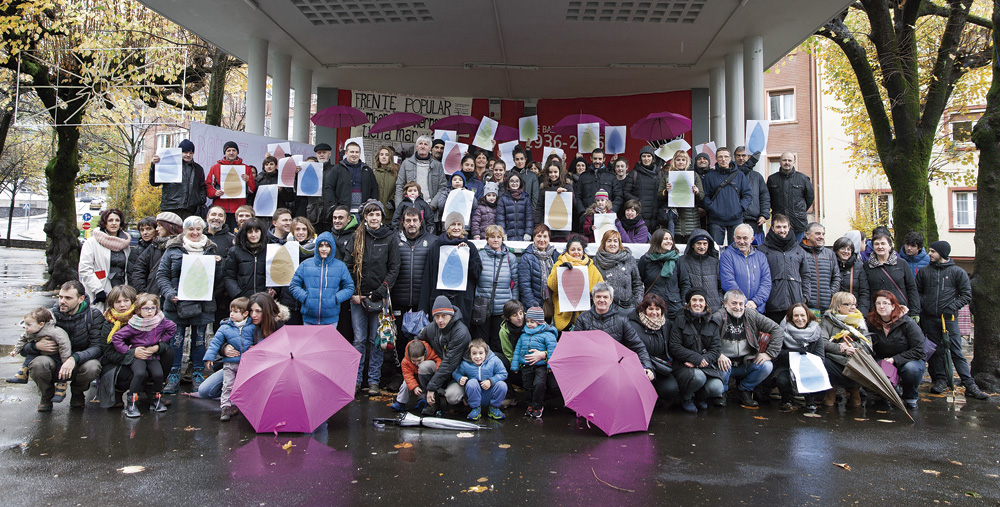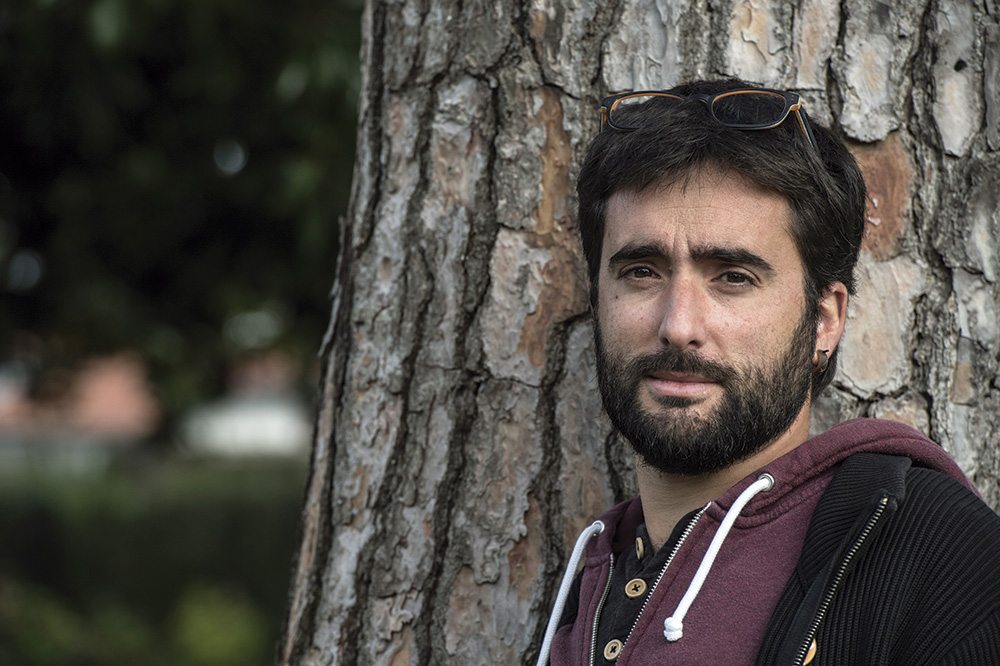"This project will be reflected not only in society, but in all public institutions"
- The Vice-Ministry of Language Policy of the Basque Government and Topagunea have signed the agreement for linguistic standardization. In 2018, on the occasion of the Basque Day, they want to make a project in all the towns of Euskal Herria. The objective is marked by the project name: Euskarak 365 egun: a new proposal to work linguistic habits and social activation in the Basque Country. We have asked Estibaliz Alkorta, director of Promotion of the Basque Country of the HPS, to explain the project.
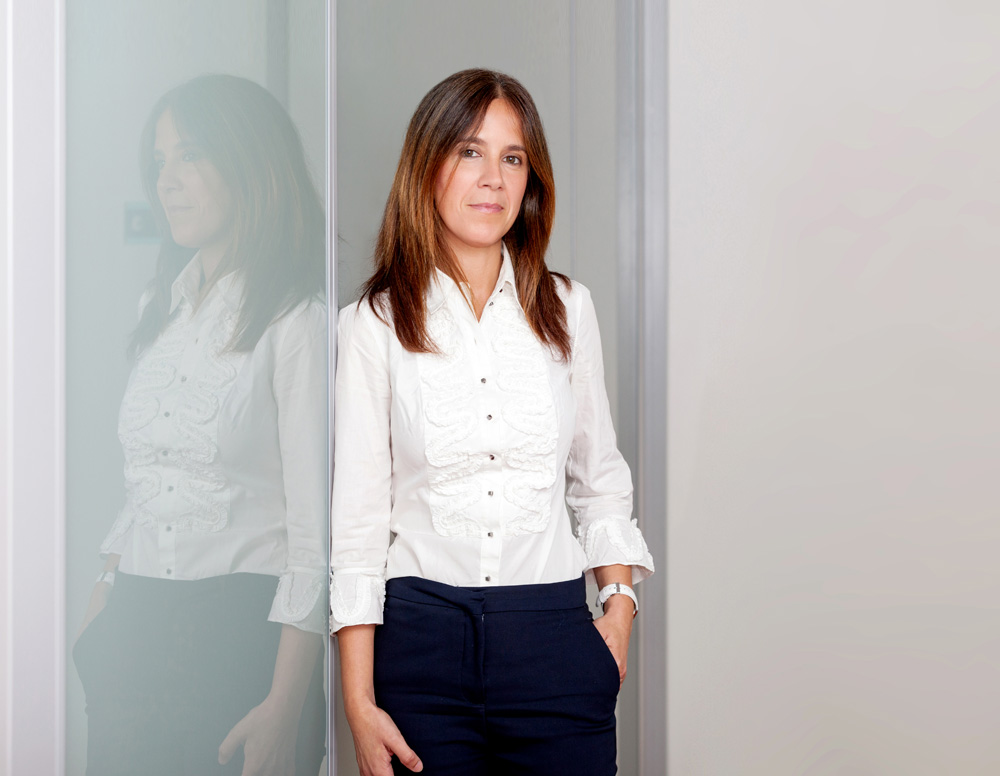
Why have you prepared this project?
Actions based on social activation are taking place in several municipalities: In Lasarte-Oria, Salvatierra, Arrigorriaga, in the neighborhood of Egia de Donostia… We thought it was the right time to give a national projection to all these initiatives and, at the same time, to offer social and economic support.
What you mentioned seemed to you to be a good initiative.
They have a novel characteristic, goes beyond the Basque side, goes a practical step, directly influences its use. It activates society, people and organizations, to that end.
What are the objectives?
The main objective is to make more use of Euskera. Another objective is to invite people and organizations to a new dynamic.
On the other hand, in addition to increasing its use, we want it to be a project based on special collaboration. In other words, if we want to influence use, we cannot fail to build a solid partnership, and when I say cooperation, I do so above all on three levels: cooperation between local authorities and national institutions; cooperation between social partners and public institutions; and cooperation between Basque cultural activity and actors operating in other areas. The project we are proposing is therefore innovative, but also the way to do the work. The objective is to use the Basque language, but also to build a line of work related to cooperation.
“The aim of the project is to use the Basque language, but also to build a line of work related to cooperation”
From the attitude in favor of the Basque, you want to take the step towards using the Basque. Specify a little.
When we say to use the Basque language, we remember two ways: on the one hand, speaking, and on the other, who does not have the ability to speak, invites him to speak in Basque what he knows. We want to ensure communication in Basque, but that does not mean that the conversation is always monolingual, as the conversations can also be bilingual to the extent that the understanding is guaranteed. From the point of view of understanding, of knowledge, there is a great capacity, so it is a good time to launch this type of innovative project.
In the meetings of the Services of the Basque Country of the Udaltop Municipalities of May, you presented the project to the agents of the world of the Basque Country and the institutions. You received contributions and sensations. What would you highlight?
The results were very positive to our astonishment. The assessment was more positive than expected. Normally when the government or the VPL present a great program there is always skepticism, “the usual thing is nothing new,” they say. This time I didn't notice it. You see that there is hope, there is desire, it was very positive that the HPS and the Topagune appeared together in Udaltop. Municipalities are preparing the 2018 budgets and everyone wants to participate in it.
However, it is true that they also showed Udaltop’s concerns. Above all, there were many perceptions related to fear or fear: “Yes, this is fine, this is the way, but how will we do it?”
Many asked why they organized the project between the VPL and the Topagune.
We didn't go to their meeting and they didn't come directly either. Topagune was carrying out actions based on social activation through the Euskarak 365 egun initiative. At the same time, we saw in the Basque Government, especially from the experience of Lasarte-Oria, that these kinds of experiences directly affect the use of the Basque Country.
Topagunea represents the majority of the Basque associations, we think it was a natural interlocutor and that we could start working together. We share the same objectives and at the same time we need each other. The meeting point could open a process of promotion and collaboration among the social actors, and at the same time, as institutions, we could carry out promotion and organization of this project among the public institutions.
Will they also help to organise other initiatives?
At Udaltop we said that this is a particular project, but that there is also a long-term line of work focused on future projects. For Topagune and for HPS, both, this type of collaboration is innovative. A climate of trust must be built and this challenge must not be put to an end. And it doesn't have to be Topagune or HPS, as has already been said, the project is going to bring together public institutions and associations. We will give a framework, general support, we will set up a working group, we will develop a communication strategy, but from there each people will form a coordination table, and the project must be yours.
How is it to be carried out in the peoples?
Our proposal is that the main facilitators be the peoples. To this end, there must be coordination between the municipal services of Euskera and the associations of Euskera. We know that in some peoples this is not going to be possible and we are going to try to do so.

Will there be flexibility?
The minimum conditions have been laid down. The proposal is for participants to be over 16 years of age, as citizens have to be aware that they have to use (or allow their use) the Basque Country for 11 days. In any case, we will open channels for those under the age of 16 to participate in the initiative. Children can be channelers from their parents. We invite children but not actively. The second condition is to live or work in the Basque Country.
From there, whoever participates in the challenge must have a minimum level of understanding. They asked in Udaltop what is going to happen to those who do not understand Euskera. We must not forget the objective: that there should be communication in Basque. Those who do not understand will be offered the tools to have a minimum level of understanding and participate in the role of “belarriprest” (that participant does not speak Basque but understands it, and invites him to do so in Basque).
What steps will you take this fall?
On 7 October we will organise a seminar aimed at Basque technicians and associations. On the one hand, the Basque Government and Topagunea will report on the work we have done and, on the other, we would like to clarify the concerns and aspirations of municipalities and associations.
On December 3, Basque Day, we would like to make a social presentation, since by then we will have worked on the communication strategy. In the events to be held in each locality, we would like to make known the challenge of 2018, the philosophy of the project.
In addition to the fall, we will conduct promotional work between January and November 2018. We thought we needed time to organize the project, but at the same time, in those months we have to maintain a point of tension.
“In 2019 we invited public institutions to take steps to change language habits in their institutions”
What after December 3, 2018?
The challenge will be visualized during those 11 days, but the project has two parts, because we want it to be a continuum. Private and public entities will invite their employees to participate in the challenge in 2018, but in 2019 we will invite all entities participating in the challenge to take steps to change language habits in their organizations.
Certain actors in the Basque world fear that Euskaldunisation will remain the responsibility of the citizens.
Public institutions also have a great challenge with regard to the institutions. The VPL is not only the Basque Government, there are health services, educational centers, Emakunde, the Ertzaintza... This project will not only be reflected in society, but in all public institutions and in all the services they provide. Support for citizenship will be provided through the VPL and Topagune, through economic and human resources. The commitment will be on both sides, on the part of citizens and public institutions.
Do public institutions not only want to give their support, but they want to be an example?
Yeah, that's it.
Will the project be carried out throughout the Basque Country?
The agreement has been established between Topagunea and the Basque Government to carry out the promotion work in all the territories, the deputies will also receive a departure and the municipalities too. The Government of Navarra, through Euskarabidea, has been integrated into the communication strategy. From the beginning, she showed us not only as a promoter but also as an organizer. It will therefore be as an organizer. With those of Iparralde (the Single Commonwealth of Iparralde) we have not yet been formally, but we know that they are very interested in doing so, although not all over the territory.
Euskaraldia, EAEko instituzio nagusi guztietan PSErekin gobernatzen duen PNVk Topagunearekin izenpeturiko akordio estrategikoa da, ez nik hala esaten dudako, beraiek publikoki 2017ko Udaltopean horrela aurkeztu eta definitu zutelako baizik. Eta Euskaraldia da PNVk, bere... [+]
Guk dakigula ez dute halakorik egin, baina Alberto Irazu kazetariak euskaraz egin du elkarrizketa zuzenean Radio Euskadin, ia 20 minutuko esperimentua.
Hernaniarrek errodajea dute, eta 2018ari begira pentsatu dute ez direla udazkeneko hotzen zain egongo. Urte osoan saiatuko dira 24 orduz euskaraz egiten. Euskara Ari Du elkartea sortu berri dute horretarako.
Aurten gehiegi pentsatu beharrik ez dago, zer egingo dugu bertso saioa, ginkana, txokolate jana, mosaikoa, lipduba? Horiek ere egingo dira, baina herri dezentetako herritarrek eta euskalgintzak motorrak berotuta dituzte. Kalera aterako dira egun osoz euskaraz egiteko asmoz.
Sustatzaile nagusi Euskaltzaleen Topagunea eta Eusko Jaurlaritza ditu. Xedea 2018ko udazkenean Euskal Herriko txoko guztietan herritarren hizkuntza ohiturak aldatzeko praktikak egitea da.
Establezimenduen zerrenda egin dute euskaraz aritzeko duten gaitasunaren arabera. Udazkenean, beste herri askotan bezala, derioztarrak “ahobizi” eta “belarriprest” bilakatuko dira.
Errenteria, Oiartzun, Pasaia eta Lezon 110 lagunek konpromisoak hartu dituzte euskara erabiltzeko.
Baiona, Angelu eta Miarritze artean egingo dute ekimena, azaroaren 27tik abenduaren 3ra bitartean. 450 hiztun mobilizatu nahi ditu BAM ekimenak. Antolatzaileek euskaraz “naturaltasunez eta alaitasunez” aritzeko deia egin dute.
Ekimen berria du Aiaraldeko Euskalgintza Kontseiluak esku artean: 1.000 ahobizi eta 5.000 belarriprest “armairutik" ateratzea. Euskaraz hitz egiten dakitenen eta hizkuntza ulertzen dutenen arteko zubiak eraikitzea da egitasmoaren xedea. Astebeteko lau txanda egingo... [+]









